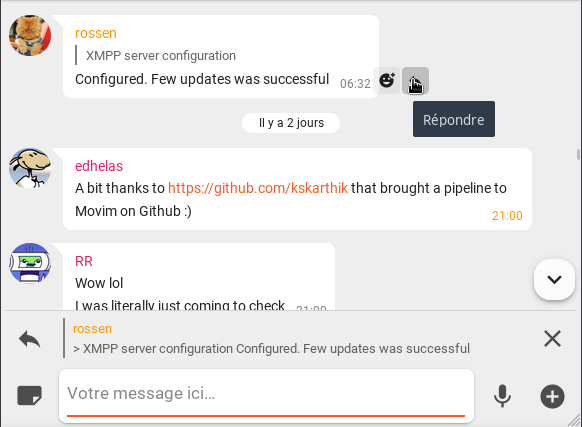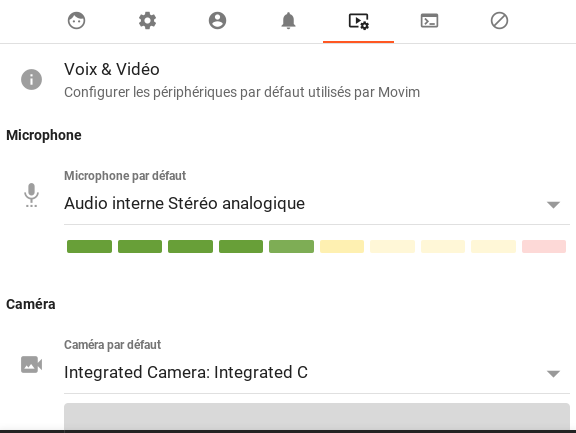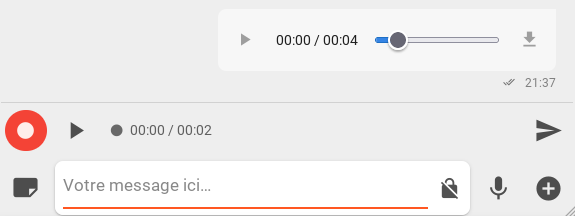Movim 0.21, codename Whipple, is finally out!

Let's have a look of all the new and improved things that you can find in this big #release 🥳
Message replies
You can now reply to messages thanks to the implementation of the XEP-0461: Message Replies.

More and more clients in the XMPP ecosystem supports this feature, including Slidge, new XMPP gateways project that is allowing you to bridge Movim with Telegram, Discord and many others chat platforms.
Push Notifications
Movim now integrates WebPush. Never miss a message, even when Movim is closed. This feature is also working when you install Movim as a Progressive Web App on your Android or iOS device.

Improved account configuration
The configuration panel has been redesigned to be more accessible.
You can now block contacts directly from your Movim instance and manage your block-list from the panel.
Microphones and webcams can also be configured and tested from the Audio & Video configuration tab.

New emojis
This version brings the support of Unicode 14 and many new emojis that you can use in your messages, posts, replies and reactions.
Redesign
Movim is following the #Material Design guidelines since 2014. This release is bringing a fresh redesign of the components and animations based on Material 3.
The main menu was reorganized to clarify the navigation and hide the second-level pages in a sub-menu that appears when hovering the account item.
Following this redesign Movim accounts can now set a banner next to their avatars.

Share and Send To
The Send To feature, that allows you to send articles to contacts was completed by a Share feature allowing you to share the article in a new publication on your personnal blog on in a Community that you're in. Useful to share things around !

Audio messages
Movim can now play and record #audio messages.

Gallery Communities
When creating or configuring your Communities you can now set a Community type. The Gallery Community forces the publications to contain at least one image and display them as a grid.

This feature is the result of a long clarification and standardization work made on XMPP Pubsub with the pubsub#type attribute, the introduction of a new XEP based on that change called XEP-0472: Pubsub Social Feed and the support of pubsub#type in ejabberd (related ticket).
Performances, memory consumption and stability
A very important work was done to limit the Movim processes memory consumption.
The daemon and subprocesses are now using PHP Opcache to load and share only once lots of files that were previously loaded multiple time during the Movim runtime. PHP modules are also loaded using a predefined whitelist to limit the usage of useless modules in memory.
DotEnv configuration
The old configuration system has been moved to the DotEnv standard. This change merges all the previous configuration (database, daemon and paths) into an unique .env file.
They can also be set using environment variable directly in your Docker Compose, or Web Server (using SetEnvin Apache for example).
The official Movim Docker image was also updated to fit those changes.
Migration from Movim 0.20
If you are planning to upgrade your current Movim instance please follow those few steps:
- Copy and rename the
.env.example file in .env and complete the few configuration variables in it. They should be the same as the one you set in the previous db.inc.php file and your daemon parameters. - Remove the
db.inc.php file - Remove all the
daemon.php parameters from your init.d, systemd services or other scripts. The daemon launch command should look this way: $ php daemon.php start.
...and as always, don't forget to run the migrations (php composer.phar movim:migrate) and restart your daemon.
XMPP Pubsub node security and restrictions
Movim 0.21 is not trusting anymore posts, likes and comments that are not containing the explicit identifier (Jabber ID) of the publisher and therefore now rely on this part of the XEP-0060: Pubblish-Subscribe - 12.16 Associating Events and Payloads with the Generating Entity.
All the existing likes and comments might be not counted anymore or seen as "Non trusted" ones. All the new published ones will be configured properly.
Migration from Movim 0.20
On ejabberd
You can update all the existing stored node configuration to force the new default configuration using the following SQL request. You might do a backup of your database before doing such changes:
update pubsub_node_option set val = `publisher` where name = `itemreply` and val = `none`
...and load those changes without restarting ejabberd:
$ ejabberdctl clear-cache
On Prosody
Ensure that you have the expose_publisher = true set in your configuration, see the related documentation.
What's next?
Movim 0.22 should include two big projects.
OMEMO rewrite ?
The cleanup, rewrite and refactoring of the OMEMO support that is quite buggy and not opmized. We are not promising anything on this side, OMEMO is always a complex beast to handle.
Multi-part audio and video-conference feature
The audio and video conferencing features were already introduced a few years ago in Movim. Some preparation work has been done in this 0.21 release to be able merge back the pop-up video-conference window inside the main window for the upcoming release.
The multi-part audio and video-conference feature is also one of the main feature that miss in Movim and is requested quite often by our users. Let's see if Movim 0.22 finally include this long awaited #feature.
Regarding the amount of work that need to be done regarding those features it might be possible that specific funding will be requested for it to free up enough time to work properly on their integration.
Enjoy!
A big thanks to the #Movim community that is growing more than ever. You can find us on our main support chatroom movim@conference.movim.eu.
If you find issues or if you want to contribute to the project you can find everything on our Github page.
And if you want to support us, fund the development of new features and help us pay our servers, domains and communication we are actively looking for supporters and sponsors on our Patreon.
That's all folks!
 chevron_right
chevron_right

















